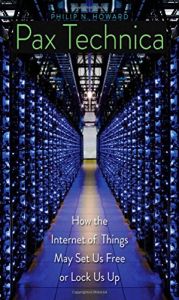Join getAbstract to access the summary!

Join getAbstract to access the summary!
Philip N. Howard
Pax Technica
How the Internet of Things May Set Us Free or Lock Us Up
Yale UP, 2015
What's inside?
Your coffeemaker is a component of the next wave of political change because it’s part of the Internet of Things.
Recommendation
Oxford University sociology professor Philip N. Howard offers a fascinating look at the Internet of Things (IoT). He carefully considers the political implications of the IoT, including how the way it is connecting the world will change political reality. His analysis is intelligent, informed, intriguing and flat-out terrifying. For example, consider his description of how China is building its own Internet or the way various groups are using bots to disrupt politics, society and the economy. In sum, he analyzes why organizations and governments must reach a “Pax Technica,” or technological peace. getAbstract recommends Howard’s comprehensive, futurist report to politicians, investors, students and anyone interested in technological change, social order or a unique historical perspective on contemporary times.
Summary
About the Author
Oxford University sociology professor Philip N. Howard, PhD, has written eight books, including The Digital Origins of Democracy and Dictatorship and Democracy’s Fourth Wave: Digital Media and the Arab Spring. He contributes to Slate, The Atlantic and other media outlets.



















Comment on this summary